BEIRUT — Demand for assistance has risen five-fold over the past two years as more
Lebanese find themselves impoverished and in need of assistance like never before, according to Father Michel Abboud, president of Caritas Lebanon.
اضافة اعلان
The catholic charity is based in a typical lower-middle-income neighborhood in the suburbs of
Beirut, Jisr El-Basha in Sin El-Fil, not too far from those most in need of its services. Outside their main headquarters, people gathered, socially distanced, waiting their turn to submit their request for assistance.
“The biggest need now is for medicines and paying deductibles for hospitalizations,” Abboud said. While some come in search of medicines they cannot find in pharmacies, the vast majority cannot afford to buy those medicines they need that are available.
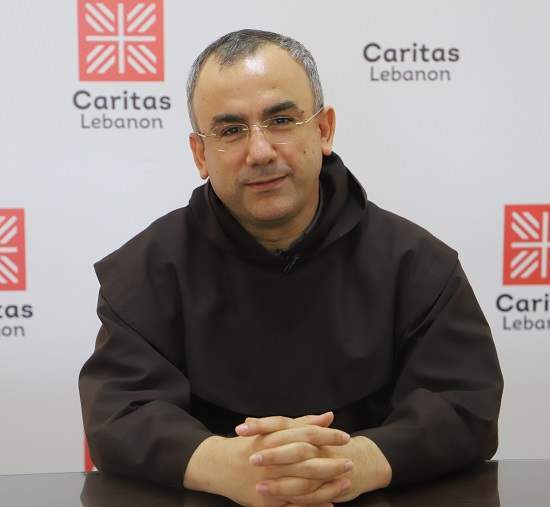 Father Michel Abboud, president of Caritas Lebanon. (Photo: Handout from caritas Lebanon)
Father Michel Abboud, president of Caritas Lebanon. (Photo: Handout from caritas Lebanon)
As I arrived for my interview with
Father Abboud, people were standing outside waiting for insulin, they were told supplies for the day had run out. Others came for baby formula; some came out clutching a tin or two.
“The numbers (of needy) are increasing, Caritas up till now can absorb them, but we fear the future if donations do not keep coming in,” Abboud told
Jordan News. Caritas’ situation is by no means unique, most charities in Lebanon are suffering similarly from a dramatic rise in demand for their services.
Real value of local donations drops
Caritas’ biggest source of donations comes from Lebanese communities in the
US and
Australia. “Currently, we rely on expatriate Lebanese who are sending us contributions from abroad, more than from within the country,” he said.
While some people stopped giving because their money has been blocked in banks, others saw their incomes and businesses shrink, but still, others who used to give in Lebanese lira still do, but the lira has lost much of its value.
“We used to collect around 800 million liras in charitable donation from across Lebanon annually, this year we collected 1.8 billion liras, but the value of the lira has fallen,” Abboud said. In fact, 800 million liras used to be worth around $534,000; at current market rates, it’s worth close to $32,000, while 1.8 billion liras are now worth just $72,000.
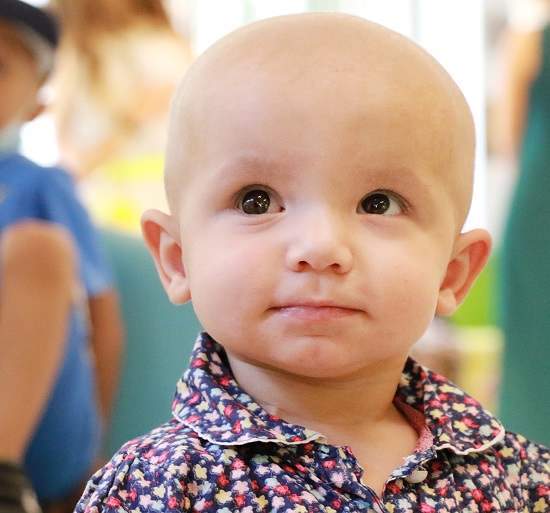 Child cancer patients receiving treatment at Children’s Cancer Center of Lebanon (Photos: hand out from CCCL)
Children’s Cancer Center of Lebanon (CCCL)
Child cancer patients receiving treatment at Children’s Cancer Center of Lebanon (Photos: hand out from CCCL)
Children’s Cancer Center of Lebanon (CCCL) has continued to serve its young patients with urgently needed, life-saving treatment and care despite the many challenges it has faced over the past two years. Fundraising manager at CCCL, Nisrene Tannous, said that contributions from the local community to the center have come down by half over the past two years: “In the past 80 percent of our funds were raised from Lebanon, now we get just 40 percent locally.”
The center, established in 2002, has had to overcome “daily challenges” since 2019, from inflation, to the
COVID-19 pandemic, to the financial meltdown and fuel scarcity and lack of medicines.
“We asked NGOs abroad to send us contributions of medicines in kind, and when our patients couldn’t reach us because of fuel shortage, we worked with hospitals that were closer to their homes to make sure we never stopped treatment,” Tannous told
Jordan News.
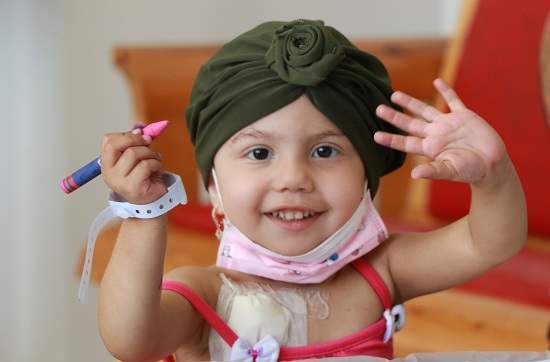 Child cancer patients receiving treatment at Children’s Cancer Center of Lebanon (Photos: hand out from CCCL)
Child cancer patients receiving treatment at Children’s Cancer Center of Lebanon (Photos: hand out from CCCL)
Abboud called on expatriate Lebanese to give and not to wait. “Even small amounts donated on a regular monthly basis can help support many families in need,” he stressed.
Uncertainty persists for future donations
“People coming to us right now asking for food and medicines exceed our capacity to fill those needs instantly, we are taking down their requests in anticipation of receiving more assistance,” Abboud said.
Sounding the alarm, Tannous said that as bad as 2020 and 2021 were, 2022 could still be worse, and they could face more challenges to providing their 350 child cancer patients under their care with the needed treatment. “We are getting support, but we don’t know how 2022 will shape up; we are in deficit for $2 million in our 2021 budget, and we have $15 million to raise for our 2022 budget,” Tannous said.
Although they are getting substantial support internationally, from NGOs and individuals — both foreign nationals and Lebanese living and working abroad — the need is great for funds as everything is being priced in “fresh dollars”.
“We used to say each patient needs $55,000 per year in treatment costs, but now with the exchange rates and prices changing daily, we simply don’t know,” Tannous added.
Mounir Jabre, a noted Lebanese philanthropist and Rotarian, said that the future in Lebanon is uncertain and that many are finding it hard to continue donating as they had before. Adding that major donors today are from the Lebanese diaspora.
“Our primary concern (at Rotary Club) after August 4, 2020, was helping hospitals damaged in the Beirut Port blast and the families who lost homes and loved ones in the blast,” Jabre said.
Fundraising efforts
This festive season, Caritas is organizing campaigns across the country to collect food, medicines, and clothing for those most in need. “Sometimes people come to us demanding we help them, we explain to them that we can only take down their details and submit their needs, but that they will have to wait, there are others in the queue before them,” Abboud said.
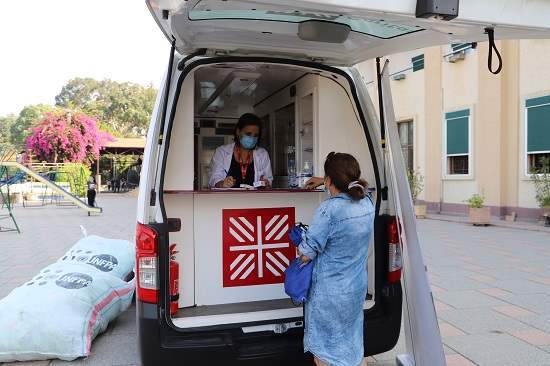 (Photo: Handout from Caritas Lebanon)
(Photo: Handout from Caritas Lebanon)
Quick adjustment of their fundraising activities helped CCCL weather the challenges they have faced since 2019, including working with other hospitals to facilitate treatment and communicating with NGOs abroad to request urgent shipments of cancer medications.
“Even after the Beirut Port blast, at a time when there was scarcity in donations locally, we acted quickly, and with the support of the international community, we were able to get support and even give a helping hand to patients receiving treatment at hospitals destroyed in the blast,” Tannous said.
Maintaining relationships with donors, shifting to online fundraising programs, and reaching out to the diaspora helped CCCL stay true to its mission and “stay standing” on its own two feet, Tannous said.
From donors to paupers asking for help
Abboud said that there are people who used to donate generously to the charity and are now impoverished and coming to the charity to ask for assistance. “We’ve seen several cases; some lost their jobs and source of income. Once, they used to give, and now they are in need, they come with tears in their eyes,” Abboud said, adding that he has seen at least 15 such cases.
Jabre said that the socio-economic shift in population in Lebanon is worrying. “Historically, the country’s prosperity came from the success of its middle class. Today this middle class is fading away or leaving the country,” Jabre said.
“Entire families and businesses are leaving. In the long term, this is very concerning. You cannot rely on the upper class; they live in their own world,” Jabre said. He said that people in the country rely on the middle class for employment, and charities rely on them for volume of contributions.
Caritas has many specific programs that donors can choose to support, including supporting families on limited incomes or those with more than three children per household. There are programs that support specific items like baby formula and diapers.
Caritas also sends mobile clinics to all areas of the country along with a team of ten doctors, each with a different specialization, to offer free medical checkups to anyone who wants it.
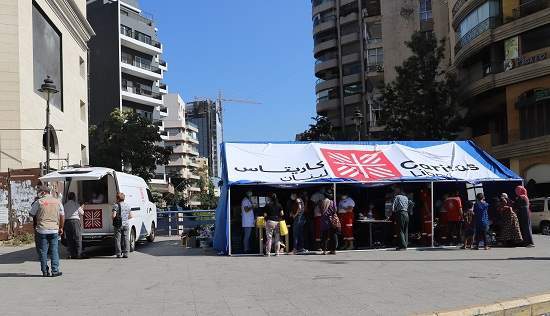 (Photo: Handout from Caritas Lebanon)
(Photo: Handout from Caritas Lebanon)
According to the charity’s booklet, this year, they had 10 health centers and eight mobile clinics offering 538,912 separate healthcare services to 33,182 beneficiaries, from diagnostic services to medical consultations and medicine dispensing.
Local banks and firms giving less
CCCL strives to treat 150 new patients each year and has aimed to raise funds, holding a gala dinner in
Dubai in November for that purpose. Although they have received funds and donated medicines from abroad, the drop in local contributions has been acute. “The financial crisis and the pandemic means companies in Lebanon can no longer give as they once did; they are in survival mode,” Tannous said.
There was a time when local banks and companies that were flourishing in Lebanon contributed generously, especially to the Rotary Club’s many programs of assistance and support. “Now banks’ contributions are down to zero, or close to zero,” Jabre said.
Negative outlook
“I have always been optimistic, but lately, as I see youngsters leaving this country, it scares me. These young people who cost their parents a fortune for their education are leaving, who will take over in ten years’ time when we are all gone or retired?” Jabre asked.
Jabre understands the reasons young people are leaving for jobs and a new life abroad, as they have lost all hope in their country.
Read more Lifestyle







